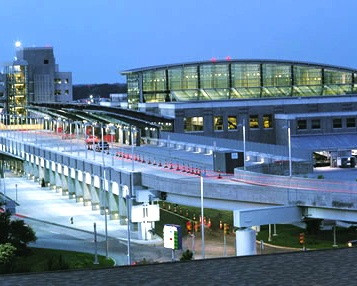Bishop: Met Café to Knickerbocker Café - Prov’s Retro Scene Isn’t in Prov Anymore, & That’s Politics
Thursday, April 27, 2017
Tonight at the Knickerbocker Café in Westerly, Dustbowl Revival takes the stage. It’s Thursday, a school night, and those are hard nights for this half-soul, half-jazz, half-bluegrass ensemble of eight from Venice Beach, California. They tour the country in a pair of mini-vans promoting their original 40s style music that charmed Dick Van Dyke so much he invited them to his home to make this video. And finding good places to play a weeknight is tough.
It might seem like they have made a mistake stopping in a town whose population is 10 times smaller than Providence, but Westerly has a big heart when it comes to music. In the good ole days, this show would have been at Lupo’s Heartbreak Hotel or the Living Room, or later the Last Call or the shortlived Roots Café. If it was a really tough night, a monday or tuesday, and they wanted to play for tips, the old Met Café might have been the venue. These throwback bands still do play the latter day Met Café that recently hosted the creole inspired quintet with a Phish like following, Donna the Buffalo, but the Met Café is in Pawtucket these days.
This came to mind when I saw a billboard announcing new digs for Providence Coal Fired Pizza . . . in Westerly. The state’s southern and western most town is a hot little number these days. Not only graced by the Knickerbocker, the renovated one-time home court of Roomful of Blues, a host of speak-easys adorn a downtown bordering a Frederick Law Olmstead designed park that hosts Shakespear in the summer. This visage escapes those who imagine Misquamicut is Westerly. It might be equally a mystery to those who stalk Taylor Swift or just a high end cup of tea in Watch Hill.
GET THE LATEST BREAKING NEWS HERE -- SIGN UP FOR GOLOCAL FREE DAILY EBLASTPushing out the music
But the coming of Providence Coal Fired Pizza is a cautionary tale for a town that seems to be hitting its stride. This pizza joint’s original home on Westminster Street had another name once, Lupo’s. But the solons of Providence thought there was a better use for that building. That was long before the Pizza company. They wanted walk-ups. And rather than emulate New Orleans, they decided there couldn’t be music downstairs.
Now, in theory, our tax system is designed to incentivize highest and best use. By taxing a building on the value the market places on it, if the present use isn’t producing returns commensurate with that worth, the owner has the incentive to seek alternatives. That would never do for our visionaries in Providence who thought they should decide what happened on every street of downtown, as if it were a Monopoly game. They chose to subsidize condos over clubs with our tax dollars.
A whole raft of consultants grew up around these practices, telling us we were just priming the pump. As soon as a few people moved downtown, the process would become self-sustaining. Look how well that has worked out. Lupo’s got chased out of its second home with more subsidized development 10 years after the first. Still hadn’t gotten that pump primed.
It is beyond ironic that the thing that made Providence a ‘cool’ place is the thing that the city strangled as they tried to capitalize on that ‘cool’ness. So completely did the city squelch this blooming retro music scene that, 40 years later, Mayor Jorge Elorza wants to buy it back by paying for the PVDfest.
Providence coulda been a contender
Providence went red hot retro in the 70s at the same time as Austin. Blues wasn’t the half of it. Providence was headquarters for Evis worship. Evis, of course, is Elvis, before he was Elvis. I used to pick up hay bales with Jack Smith, he of the Rockabilly Planet who explained this to me. That raw talent drawn from Memphis’ explosive mix of white country blues and race music was a catalyst for exploring rock and roll in its infancy. Even as the Stones filled stadiums, greased standup hairdos ruled Westminster Street.
While the rest of the world went forward into grunge, Providence was turning back the clock. Not, of course, without some edge, perhaps defined by the Young Adults. The city was alive with bands that made sure every little club was hoppin’ every night. And back then, in the 70’s, nobody cared what happened downtown!
It was the same for Austin whose famous 6th Street was infamous in the old days. Texas Monthly Magazine observes: “In 1972 the Austin music scene exploded with a new, rootsy form of country that turned its back on Nashville and embraced the counterculture.”
Roots is the latest way to describe neo-traditional trends. The important thing is that the political trends in Austin were not so covetous. They managed to keep their hands off the scene enough so as not to strangle the baby in the cradle. Now this endemic busking in every bar is bursting at the seams, paying immense dividends to the city and catalyzing the SxSW festival which Mayor Elorza would imitate. And that is just what it is, an imitation. It isn’t about whether its ‘good’, has a different sound, or how many days it runs, or how many people come -- it’s artificial.
PVDfest can’t create a scene, it works the other way round.
If the city doesn’t have it’s own scene, the festival is kind of like going on a cruise. And when all the imported music gets off the boat, the party’s over. Nobody thinks that way in Austin. Many of us avoid the SxSW festival and can’t wait for the real music to get going again.
Now, it isn’t fair to say Providence has no scene, but not one with trajectory. Around the edges, awesome little venues persevere. Nick-a-Nees stands up to any dive bar anywhere. And the Penalty Box . . . oops, that’s what used to be there . . . the Parlour on North Main Street puts good food and good music in a timeworn bar setting. And there are a several venues that escape some or all property taxes if not notice for eclectic live music – AS220, Firehouse 13 and Fete.
Tax breaks are not an economic development plan
Some might say that’s a good thing. Isn’t that great after all the subsidies for condos? You don’t fix dislocation by more dislocation. Bert Crenca and the guys at AS220 however parrot the National Endowment for the Arts line on this: “Art workers pay taxes, and art contributes to economic growth, neighborhood revitalization, and the livability of American towns and cities.” I say the same thing about Walmarts. But less tendenciously, how are clubs and artist’s enclaves that pay taxes supposed to compete? The logical end of this charade is that no one pays taxes.
It isn’t that we haven’t had a charitable tradition of arts in our culture. But the idea was not government as patron. Providence is by no means the only place wrestling with this trend. Indeed, Westerly’s Knickerbocker has gone the non-profit route recently. After enormous private investment in bringing the club back after it closed in the wake of the Station fire the club opened in the midst of the economic doldrums of 2008 and simply couldn’t support its reimagined self.
But Providence has made itself a particularly expensive place to do business and has developed such a reputation for passing out tax absolutions that virtually anyone considering investing in the city queues up to see how many wheelbarrows of public money they can haul away. Tax-free has become a way of life for any proposed development.
and now . . . McCoy wants to be about the music too
Which brings us full circle to Pawtucket. After pledging loyalty to McCoy and benefitting from the grassroots citizen movement that denied Providence a waterfront stadium, suddenly Pawtucket wants its own waterfront stadium. It is a great idea too, if the Pawsox want to pay for it!
Fortunately, it isn’t easy to imagine too many Providence legislators who will be eager to support Pawtucket’s bid for state largess -- nevermind the outstate reps who were suspicious of this business model from the start.
No duh, you could have a few concerts there too (they have even figured that out at McCoy). But are they going to be like the PVDfest, taxpaying to play affair, or is this an indication that the project is contemplated to pay for itself? What happened to the plan for more economic activity around the stadium, on the model of Patriot Place? It should be the proceeds of that development that pays for the stadium.
A scene is a wonderful thing to have, but it’s like love. You can’t buy it.
Brian Bishop is on the board of OSTPA and has spent 20 years of activism protecting property rights, fighting overregulation and perverse incentives in tax policy.
Related Slideshow: Winners and Losers in Raimondo’s FY18 Budget Proposal
Related Articles
- Bishop: Tax [Breaks] and Spending
- Bishop: Welcome Joe Biden, to Roads That Don’t Work
- Bishop: Life in the Slowlane
- Bishop: It Takes [The] Village [People]
- Bishop: Revolutionary Providence Primaries
- Bishop: Structural Changes to Address Structural Deficit
- Gencarella & Bishop: Billion Dollar ‘Big Dig’ - Fewer Bridges, Fewer Cars, Nearly Double The Cost
- Bishop: 38 Stabilizations - Neverending Prov Tax Giveways are 38 Studios Redux
- Bishop: The Soft Under Belly of Rhodeworks - A Connector to Nowhere
- Bishop: Post-Toll Impasse Between Public and Political Will
- Bishop: 6/10 Connector - The $800 Million Mile
- Gencarella & Bishop: Political Football v Public Safety
- Bishop Tobin: Catholic Church Had “No Choice” in Firing Gay Music Director
- Whitehouse Faces Angry Crowd of Hundreds at Nathan Bishop Middle School in Providence
- Bishop: Our Love Hate Relationship With Amtrak
- Bishop: Localism vs. Infrastructure
- Bishop: Corporatism for me But Not for Thee - Competing Proposals for 195 land?
- Bishop: Government as a Business? After all, the Free Stuff From Government Isn’t a Loss Leader!
- ABC6’s “In The Arena” Features Paolino and Bishop Tobin
- Bishop: Not Much Difference Between Mainstream Media & Fake News
- Bishop: Trump for President
- Bishop: Sleepy South County or Races That Matter?
- Bishop and Fired Catholic Music Director Get Into Media War
- Bishop: Have an Alt-Thanksgiving
- Bishop: Immigration, is it Really black and White?






















